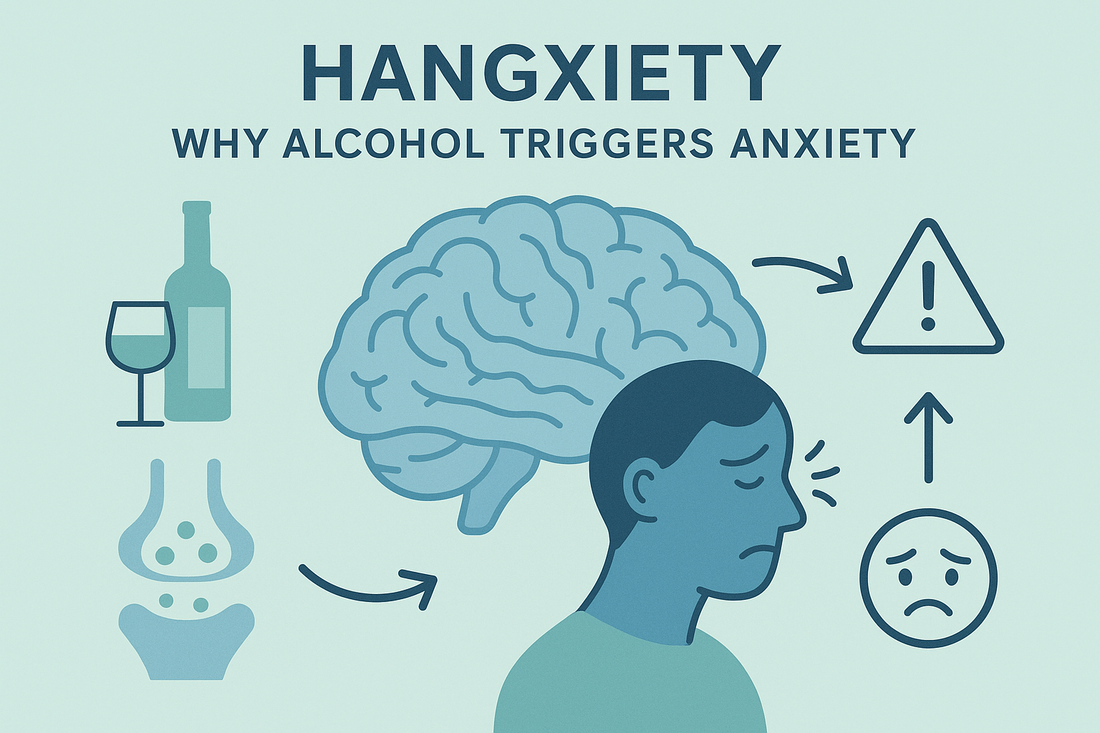
Hangxiety is Real: Why Alcohol Triggers Anxiety (and What to Do About It)
You wake up after a night of drinking and the headache and thirst are expected. But sometimes, there’s something worse: the creeping, restless feeling of dread. Your thoughts race, your stomach churns, and you can’t shake the uneasy vibe. If this sounds familiar, you’ve experienced hangxiety — hangover anxiety.
And you’re not alone. More people are realizing that hangovers don’t just bring physical symptoms like dehydration and fatigue. They also impact mental health. In this article, we’ll explain why alcohol can trigger anxiety, the science behind hangxiety, and practical strategies to calm both your body and mind.
What Is Hangxiety?
Hangxiety is the term used to describe feelings of anxiety, nervousness, or unease that occur during a hangover. While not everyone experiences it, studies suggest it’s increasingly common among younger adults who report heightened sensitivity to alcohol’s after-effects.
According to the National Institute on Alcohol Abuse and Alcoholism, alcohol affects the brain’s neurotransmitters in ways that temporarily reduce stress and inhibition — but once the effects wear off, the brain can rebound in the opposite direction, creating heightened anxiety.
Why Alcohol Causes Anxiety
The connection between alcohol and anxiety is complex but very real. Here are the main reasons it happens:
- Neurotransmitter imbalance: Alcohol boosts GABA (a calming neurotransmitter) and reduces glutamate (an excitatory one). When the alcohol wears off, the rebound effect can make your brain feel overstimulated and anxious.
- Increased cortisol: Alcohol raises cortisol, the stress hormone. Elevated cortisol can leave you feeling restless and on edge.
- Sleep disruption: Even if you sleep a full night, alcohol prevents you from reaching deep REM stages. Poor sleep quality is strongly linked to higher anxiety the next day.
- Dehydration and blood sugar drops: Physical stressors like low hydration and unstable blood sugar amplify anxious feelings.
- Memory gaps: Forgetting parts of the night can trigger overthinking and worry about what you did or said.
Who Is Most Likely to Experience Hangxiety?
Not everyone feels anxious after drinking, but certain factors increase your chances:
- Pre-existing anxiety: If you already deal with anxiety, alcohol may worsen symptoms.
- Introverted personality: Research suggests introverts may feel stronger post-drinking anxiety due to social overstimulation.
- Lack of sleep: Poor rest makes your body more vulnerable to stress and nervousness.
- Drinking patterns: Binge drinking or mixing alcohol with caffeine tends to worsen hangxiety.
Signs You’re Experiencing Hangxiety
Hangxiety can show up in both mental and physical ways. Common signs include:
- Racing or intrusive thoughts
- Restlessness or inability to focus
- Rapid heartbeat or shallow breathing
- Stomach discomfort or nausea
- Feeling guilty, embarrassed, or regretful about the night before
How to Manage Hangxiety
The good news is that hangxiety usually passes within a day, but you don’t have to suffer through it. Here are practical ways to calm your body and mind:
1. Rehydrate with Electrolytes
Dehydration worsens both physical and mental symptoms. Electrolytes like sodium, potassium, and magnesium help restore balance, making your body feel more stable and less stressed. A glass of water with electrolytes in the morning can make a big difference.
2. Eat a Balanced Meal
Low blood sugar fuels anxiety. Eating protein (eggs, yogurt), complex carbs (whole grains, oats), and healthy fats (avocado, nuts) helps stabilize your system and reduce jitteriness.
3. Practice Breathing or Meditation
Simple breathing exercises (like box breathing: inhale 4, hold 4, exhale 4, hold 4) calm your nervous system. Guided meditation apps can also reduce racing thoughts.
4. Move Gently
A brisk walk, light stretching, or yoga improves circulation, lowers cortisol, and boosts endorphins. Even 15 minutes outdoors can lift mood significantly.
5. Limit Stimulants
It may be tempting to drown your hangxiety in coffee, but too much caffeine can spike anxiety. Stick to moderate amounts and pair it with water.
6. Rest and Reassure Yourself
Remind yourself that hangxiety is temporary and chemically driven — not a sign that something is deeply wrong. Gentle reassurance helps keep spiraling thoughts in check.
Preventing Hangxiety Next Time
While no strategy eliminates it entirely, you can reduce the chances of experiencing hangover anxiety:
- Eat before drinking to slow alcohol absorption.
- Alternate alcoholic beverages with water throughout the night.
- Set a personal limit and stick to it — fewer drinks often mean fewer anxious symptoms.
- Prioritize sleep after drinking — the better rested you are, the less anxious you’ll feel.
- Consider tracking your triggers — if certain types of drinks or settings worsen anxiety, you can adjust your habits.
FAQs About Hangxiety
Is hangxiety normal?
Yes, many people experience anxiety after drinking. It’s a common physiological response and doesn’t mean something is wrong with you.
How long does hangover anxiety last?
Hangxiety usually lasts a few hours to a day, depending on how much you drank, your sleep quality, and your hydration status.
Does coffee make hangxiety worse?
Too much caffeine can intensify anxiety. A small cup may help with alertness, but pairing it with hydration and food is best.
Can alcohol cause long-term anxiety?
Chronic heavy drinking can increase the risk of anxiety disorders over time. Occasional hangxiety isn’t the same as a long-term condition, but it’s a reminder to be mindful of drinking habits.
The Bottom Line
Hangxiety is real — and it’s a mix of biology, chemistry, and lifestyle factors. Alcohol alters neurotransmitters, increases stress hormones, and disrupts sleep, all of which can leave you anxious the next day. But with hydration, balanced food, movement, and mindfulness, you can calm both your body and mind as you recover.
And if you’re looking for a little extra help with hydration and energy, an electrolyte + caffeine blend like Rally Reset can support recovery as part of your morning routine. Because getting past hangxiety isn’t just about making it through the day — it’s about resetting and feeling good again.



